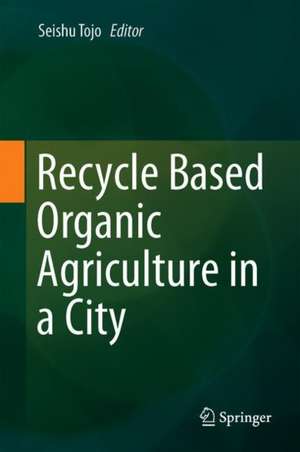Recycle Based Organic Agriculture in a City
Editat de Seishu Tojoen Limba Engleză Hardback – 10 dec 2019
| Toate formatele și edițiile | Preț | Express |
|---|---|---|
| Paperback (1) | 582.12 lei 6-8 săpt. | |
| Springer Nature Singapore – 30 dec 2020 | 582.12 lei 6-8 săpt. | |
| Hardback (1) | 644.82 lei 6-8 săpt. | |
| Springer Nature Singapore – 10 dec 2019 | 644.82 lei 6-8 săpt. |
Preț: 644.82 lei
Preț vechi: 758.60 lei
-15% Nou
Puncte Express: 967
Preț estimativ în valută:
123.40€ • 133.100$ • 103.66£
123.40€ • 133.100$ • 103.66£
Carte tipărită la comandă
Livrare economică 22 aprilie-06 mai
Preluare comenzi: 021 569.72.76
Specificații
ISBN-13: 9789813298712
ISBN-10: 9813298715
Pagini: 240
Ilustrații: XVI, 240 p. 105 illus., 73 illus. in color.
Dimensiuni: 155 x 235 mm
Greutate: 0.54 kg
Ediția:1st ed. 2020
Editura: Springer Nature Singapore
Colecția Springer
Locul publicării:Singapore, Singapore
ISBN-10: 9813298715
Pagini: 240
Ilustrații: XVI, 240 p. 105 illus., 73 illus. in color.
Dimensiuni: 155 x 235 mm
Greutate: 0.54 kg
Ediția:1st ed. 2020
Editura: Springer Nature Singapore
Colecția Springer
Locul publicării:Singapore, Singapore
Cuprins
Chapter 1: Status and Prospects of Urban Agriculture.- Chapter 2: Discharge and Recycling of Urban Wasted Biomass.- Chapter 3: Carbonization of Waste Biomass and Carbon Sequestration.- Chapter 4: Nutrient Recovery from Wasted Biomass using Microbial Electrochemical Technologies.- Chapter 5: Energy Production from Wasted Biomass.- Chapter 6: New Technologies to Implement Precise Management of Farming in a City.- Chapter 7: Soil Health and Carbon Sequestration in Urban Farmland.- Chapter 8: Cover Crop Farming System.- Chapter 9: Symbiotic Co-Existence of Paddy Field and Urban Ecosystem.- Chapter 10: Recycle-based Organic Agriculture in Japan and World.
Notă biografică
Seishu Tojo, Institute of Agriculture, Tokyo University of Agriculture and Technology, Tokyo, Japan
Textul de pe ultima copertă
This book highlights the significance of urban agricultural production, the technologies and methods for supplying organic materials to the farmland, recovering plant nutrients and energy in cities, and systems for sustaining farmlands in order to produce agricultural crops and supply safe food to citizens. Focusing on the effective recycling of biomass waste generated in cities for use in organic farming, it discusses alternatives to traditional composting, such as carbonizing organic waste, which not only produces recyclable materials but also converts organic waste into energy. Recycling discarded organic matter appropriately and reusing it as both material and energy is the basis of new urban organic farming, and represents a major challenge for the next generation of urban agriculture. As such, the book presents advanced research findings to facilitate the implementation of safe, organic agricultural production with only a small environmental load.
Caracteristici
Provides new technologies developed at universities and implemented at neighboring farms. Includes numerous figures and tables to aid understanding. Highlights the significance of technologies and systems in a way that not only engineers and scientists but also non-experts can understand.
